
Largest Coworking Companies


Starting a business certainly feels like a challenge — at least, until you try to scale it, at which point you realise how lightly the low expectations of starting out rested on your shoulders. Compare it to the sophomore slump: you succeeded where failure wasn’t too big a concern, but now there’s a viable business at stake. Messing up means wasting a golden opportunity.
The scaling stage is particularly brutal because of how slowit can be. Some businesses manage to double fairly quickly, but others take years to manage it. That said, one of the many benefits of this digital era is that businesses are more willing to try new tactics — some of which are capable of greatly supporting growth.
One tactic that’s particularly sound is coworking, and there are plenty of companies leaning heavily on it to speed up their development. But why is it so effective for this? Let’s take a closer look at what makes coworking such a powerful tool for rapid-fire scaling:
Despite the best efforts of office managers since time immemorial, the standard 9-to-5 slot isn’t necessarily the most productive period for every worker, and is often a very poor choice. Everyone has a unique circadian rhythm, and feels most alert at different times of day — one employee will be hammering out content at 7am, while another will experience their biggest burst of creative energy as the sun begins to set.
There are two main issues with the classic office setup: firstly, it will present security issues if left open late, requiring employees to leave before regular hours are up — and secondly, having a single viable location will saddle various employees with varying commutes, making it difficult for them to arrive or leave at unusual times.
If you embrace coworking, however, you can maintain several viable locations, significantly cutting down on commuting, and you can allow people to work at night if they prefer (after all, most coworking buildings are accessible on a 24/7 basis, with security handled by the owners). This will make the most of people’s preferred working styles.
When you’re stuck in an office with your colleagues, you can form a tight bond with them (useful), but you’ll only be exposed to perspectives similar to your own (less useful). Scaling a startup requires a lot of creative energy, and that energy feeds off fresh input and insight into other companies, products and services in that industry.
In a coworking space, every day can bring a fresh opportunity to meet someone new. Two workers might have completely distinct disciplines, but that doesn’t mean that they can’t inspire each other in broader ways. Imagine the possibility of a teenage entrepreneur (fresh off buying their first business and aspiring to retail success) striking up a conversation with a seasoned architect with no tech skills but plenty of soft skills and decades of expertise. What might they learn from each other?
It’s also nice for someone to get outside their own bubble whenever possible. When times are tough, it’s easy to think that it would be better to work somewhere else (anywhere else), but when a professional hears about someone else’s problems, there’s a good chance they’ll realise that their situation isn’t so bad after all.
For both of the reasons we’ve already looked at, coworking makes for happier employees. They have more control over the circumstances of their work — they can meet new people, commute less, and choose between locations — plus they can work the hours they prefer. And having enthusiastic employees is essential for scaling.
Why? Well, it’s simple enough: in many cases, regular employee hours aren’t enough to help a business grow. Overcoming that hurdle often demands extra input and effort, which in turn might require the occasional 50-hour week, or 60-hour week, or even beyond that. And if managers of regular offices ask their employees for that type of commitment, said employees will likely burn out quickly, or simply refuse to be involved.
But if they allow their employees to have some degree of autonomy, they’ll be much happier, and develop greater company loyalty: the type of loyalty that will drive someone to grind through a 60-hour week to help their company grow.
Renting an office is typically done on a monthly basis, at the very least. If the manager is going to have everyone in for every day of that period, that’s reasonable enough… but what if several employees take annual leave at the same time, leaving them with twice the office space they need? While they’re away, the company is still paying for the entire space. And if there’s some type of company trip arranged, it will end up paying for an empty office while everyone’s away.
Because coworking spaces are always accessible, a manager can make an arrangement that actually suits when (and for how long) they need a particular space. If no one uses a particular space for an entire day, the company might not need to pay anything. You still need to be aware of the costs inherent to the coworking approach. But when used well, it makes it possible to save a lot of money that can be put towards growing the business.
For these four reasons, and no doubt many more, coworking is a superb operational solution for growing startups. If you’re running a startup, think about how you could save money, make your employees happier, and benefit from the networking opportunities inherent to working in a communal space. Why not give it a try?
Save your community manager 41 hours each week—learn how The Yard did it with cloud-based access control.
Read the Case StudyThe Guide to Make Your Space More Profitable
Including interviews with experts and consultants.
Free access to our best guides, industry insights and more.
